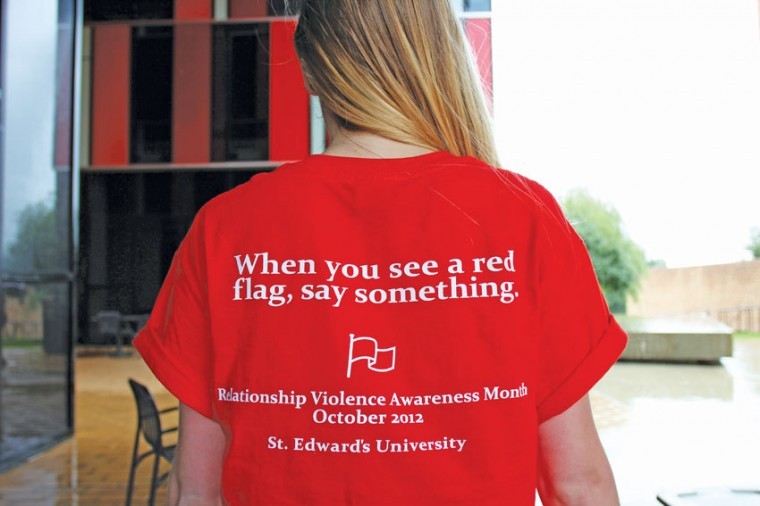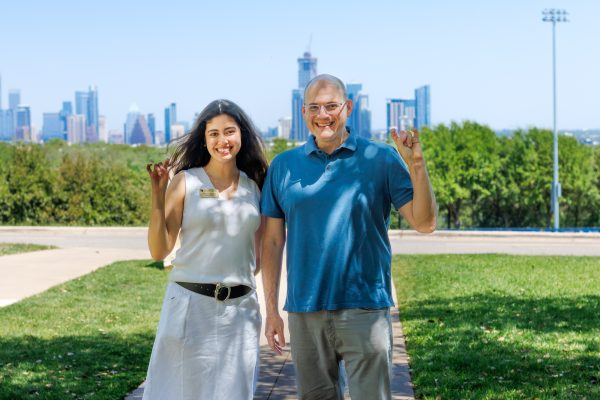Events encourage students to address relationship violence
October is relationship violence awareness month, and the university is doing its part to make students aware of the dangers of relationship violence through various activities and guest speakers.
For the month of October, red flags and posters placed around campus are part of a campaign to encourage college students to step in and say something when they see warning signs that indicate there is violence in a friend’s relationship.
“Research indicates that relationship violence is prevalent on college campuses, and as a result it’s important to work to ameliorate the problem,” Wellness and Outreach Services Coordinator Pete Erickson said.
Startling statistics have proven that relationship violence is a very real issue.
The National College Women Sexual Victimization Study found that for their sample, the rate of completed and attempted rapes was 35 per every 1,000 female students. Of these women, nine of ten offenders were someone the victim knew beforehand.
The American Association of University Women Educational Foundation found in their study that four out of five students have experienced some form of sexual harassment during their school years.
The relationship violence awareness month activities work to make students aware of these statistics and more.
Outside resources, such as SafePlace, are also coming onto campus to participate in various speaking engagements.
SafePlace, a community that helps victims of sexual and domestic violence, also works to promote healthy relationships to prevent sexual and domestic violence. If people are in need of a safe place to go after experiencing domestic or sexual violence, they can get in contact with SafePlace and have somewhere to go to escape their circumstances.
On Oct. 29, Annette Saenz of SafePlace will lead a simulation that will give students, faculty and staff insight into the difficult choices a victim of relationship violence has to think through. The simulation has been tailored especially for college students.
“It’s important for people to be aware of these issues because not enough people speak up about it happening to them.” senior Jessye Padilla said.
Padilla credits people not being aware that they are not alone and that there are others that have been victimized as the reason why victims do not feel comfortable speaking up.
Not only is it important to know how to reach out for help should this situation occur, it is also important to be proactive as well. The activities that the university is promoting aim to be both proactive and reactive.
“I think it’s important so people can recognize red flags in their own personal relationships as well as in the relationships of others close to them,” junior Anne Marie Hollonds said.
Hollonds said that if people can learn to recognize these signs and see these signals, they can be more prepared to effectively help someone in an abusive relationship.
Relationship is especially prevalent in other nations, an especially important fact to consider since the university promotes global awareness.
On Oct. 25 in the Ragsdale Lobby, students can learn more about violence against women around the globe. A table will provide information about not only the problem, but about ways students can become part of the solution.
“Awareness is the first step in the process of decreasing the incidence of relationship violence on campus. If you’re not aware that there’s a problem, the process to ameliorate it never begins. If you’re aware that there’s a problem, you can make a conscious choice to do something about it,” said Erickson.
It is also important for students to participate in the Relationship Violence Awareness Month activities to clear up any misconceptions they may have about relationship violence.
One of the biggest misconceptions, according to Erickson, is that verbal or physical abuse is somehow the victim’s fault.
“No one has the right to verbally or physically abuse you,” Erickson said.
Another big misconception is that most sexual assaults are perpetrated by strangers. The vast majority of offenders are known to those they assault.
“You can help. Come to the workshops or information tabletops during Relationship Violence Awareness Month and get suggestions on how to intervene safely when you witness verbal or physical violence,” said Erickson.
This year’s relationship violence awareness month events are made possible with efforts from the St. Edward’s University Health and Counseling Center and the Hilltop Peer Health Educators. SafePlace and Phi Alpha, the Social Work Honor Society, also co-sponsored several events.







